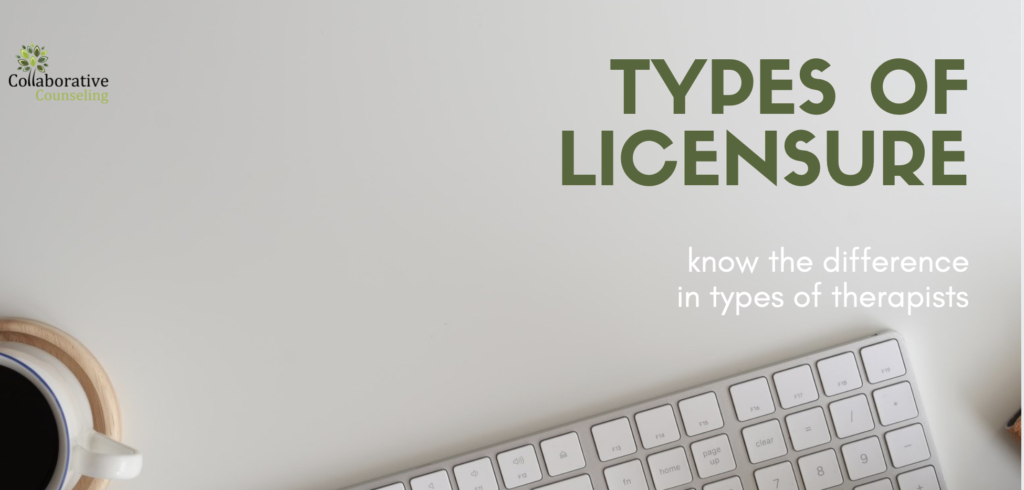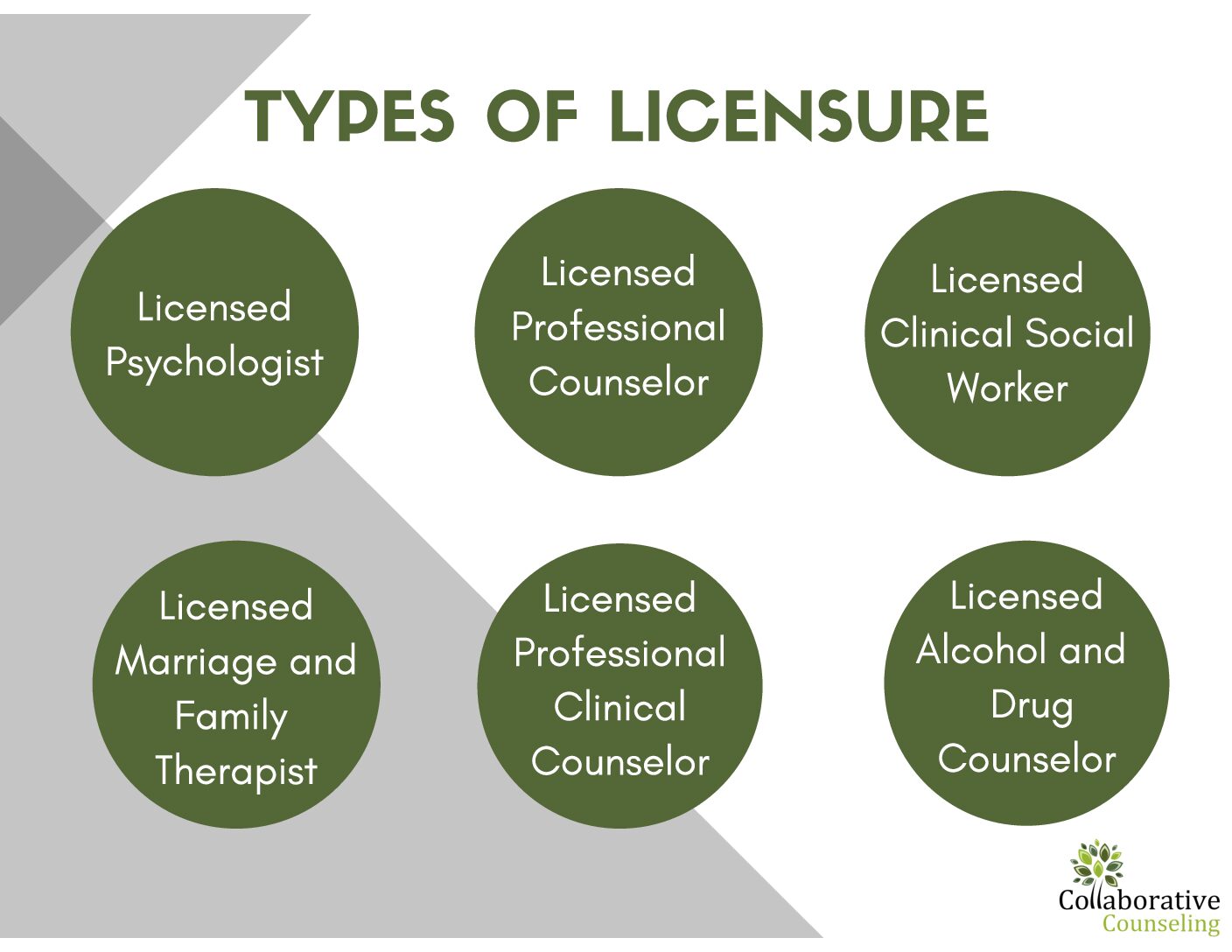Types of Licensure
Posted by Collaborative Counseling

This article shares about types of licensure so you can understand the difference in types of therapists. There are several ways that one can pursue education in order to become a therapist. Understanding the differences in each licensure will help you understand how your therapist, or potential therapist is trained.
Here we will outline some of the most common licensures that our therapists have here at Collaborative Counseling.
Masters Degree
Above all else, a masters degree is required before obtaining licensure. Therapists can received a masters degree in many areas of study. These include psychology, social work, counseling, mental health counseling, marriage and family therapy, and many more.
It typically takes two years to complete a masters program. And requires completion of a four year degree.
Once a masters degree is obtained and before one can take the state or professional exam, several steps of provisional licensure and supervised counseling take place. When an applicate completes and passes this exam, they are a licensed therapist.
In the U.S., requirements for becoming a therapist are determined by state. As a result, the requirements vary depending where you live.

Here are general descriptions and requirements of different licensure.
Licensed Psychologist (PhD, PsyD, or EdD)
Generally, you will need a doctoral degree to practice as a licensed psychologist. Doctorate programs are often the highest level of education in most fields. They take around four years to complete, after completing a bachelors degree. These psychologists have the ability to do psychological testing. In general, other licensed professionals cannot.
Licensed Professional Counselor (LPC)
Licensed Professional Counselors are masters level mental health providers. They require:
- A minimum of 700 hours of supervised field experience in graduate school
- Depending upon degree, 2,000-3,000 hours of post-graduate clinical supervision hours
- Passing the credentialing exam
These professionals can work in a variety of settings, including communities and private practice. LPC’s work with individuals, families, couples and groups.
In Minnesota, LPC is not a common licensure, but Wisconsin uses these requirements for LPC’s.
Licensed Professional Clinical Counselor (LPCC)
Licensed Professional Clinical Counselors are also masters level professionals that have a masters degree in counseling or another related field. Some requirements for these counselors include:
- an additional 2,000 post graduate supervision hours for licensure compared to LPC’s, for a total of 4,000 hours.
- passing the credentialing exam
This is a more common licensure in Minnesota because this is the license insurance companies will reimburse.
LPCC providers can work in a variety of settings including private practice, residential facilities, community based agencies, schools and more! This licensure level is trained to offer therapy to individuals, couples, families, and groups.
Licensed Independent Clinical Social Worker (LICSW)
A Licensed Independent Clinical Social Worker is within the field of Social Work. These training programs focus on therapy from a perspective of the community that surrounds oneself.
To become a LICSW:
- First, one must get their masters in social work (MSW)
- After that you work towards licensure via clinical experience in and after graduate school.
- After schooling comes a post graduate school experience. During this time social workers are supervised by a fully licensed person before receiving their own independent licensure.
- Then they must take the state licensing exam.
Also, another variation of LICSW’s is a Licensed Clinical Social Worker (LCSW). This includes minor changes in requirements from state to state. For example, LCSW’s practice in Wisconsin, while LICSW’s practice in Minnesota.
A big benefit of this type of license is the type of insurance that LICSW’s and LCSW’s can accept. For example, they are able to accept Medicare if they choose to, while other licensed professionals do not have the option to accept this due to Medicare guidelines.
Licensed Marriage and Family Therapist (LMFT)
Licensed Marriage and Family therapists are another sub-sect of mental health providers that offer services to couples, families, and individuals. While LMFT’s do tend to work more in family and relationship settings, this is not the only population LMFT’s can work with.
Marriage and family graduate programs focus more on the family systems and relationships surrounding one’s life. This training informs and impacts the way LMFT’s approach therapy.
These therapists require:
- 4,000 hours of post graduate supervised experience
- Passing the national MFT exam.
LMFT’s can also work in private practice, community settings or residential facilities.
Licensed Alcohol and Drug Counselor (LADC)
Licensed Alcohol and Drug Counselors are master level professionals. They require:
- Completion of 880 hours of supervised experience during the alcohol and drug graduate program
- Candidates must pass the licensing exam
Having a variety of training programs for counseling helps keep our field diverse. It also helps provide a variety of specialties in our field. The vast array of services that are offered come from the differences in licensure. Providers with different licensure often focus their practice in certain specialties based on their degree and license.
However, a provider’s specific area of expertise could vary. It is best to schedule an appointment or meet a therapist personally to see if they are the best fit for you. We hope it helped to learn about the types of licensure of our providers.
For more information, call our office today to see who is available and may be a good fit for you! To learn more about our providers visit our website at https://www.collaborativemn.com/meet-our-team.
Read More
 View Our Locations
View Our Locations Request Appointment
Request Appointment